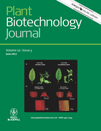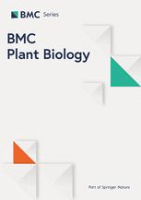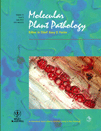
aBIOTECH
metrics 2024
Connecting scientists to shape the future of biotechnological applications.
Introduction
aBIOTECH, published by SPRINGERNATURE, is a premier academic journal dedicated to advancing the fields of biotechnology, agronomy, and molecular biology. With an impressive ISSN of 2096-6326 and E-ISSN 2662-1738, this journal has established itself as a vital resource for researchers and professionals aiming to publish high-quality, impactful studies. Based in Singapore, aBIOTECH has achieved remarkable recognition, boasting a Q1 ranking in multiple categories including Agronomy and Crop Science, Biochemistry, and Genetics in the 2023 Scopus rankings. Its solid position in the 90th percentile for Biochemistry and Genetics reinforces its significance within the global scientific community. The journal covers a broad spectrum of topics relevant to both basic and applied research, facilitating a shared dialogue amongst scientists and encouraging collaborative progress in innovative biotechnological applications. The open-access nature of the journal ensures that cutting-edge research is freely available, fostering a global exchange of ideas that is critical to the advancement of science today.
Metrics 2024
 1.33
1.33 4.60
4.60 4.50
4.50 16
16Metrics History
Rank 2024
Scopus
IF (Web Of Science)
JCI (Web Of Science)
Quartile History
Similar Journals

PLANT BIOTECHNOLOGY JOURNAL
Empowering research to transform agriculture and biotechnology.Plant Biotechnology Journal, published by Wiley, is a premier open-access platform dedicated to advancing the field of plant biotechnology. Since its inception in 2003, this journal has played a pivotal role in disseminating high-quality research that enhances our understanding of plant genomics, biochemistry, and molecular biology. With an impressive impact factor and a prominent position in Q1 quartiles across Agronomy, Crop Science, Biotechnology, and Plant Science, it ranks among the top journals globally, reflecting its significant influence in the agricultural and biological sciences. Researchers and professionals can access cutting-edge studies and reviews that facilitate innovation in sustainable crop production and biotechnology applications. The journal's transition to an open access model since 2016 has further amplified its reach, ensuring that vital research is available to a global audience, promoting collaboration and knowledge sharing within the scientific community.

Current Plant Biology
Illuminating the Path of Plant DiscoveryCurrent Plant Biology is a distinguished peer-reviewed journal published by ELSEVIER, focusing on the dynamic and rapidly evolving field of plant sciences. Since its inception as an Open Access publication in 2014, it has established itself as a leading platform for innovative research, boasting a remarkable Impact Factor that underscores its relevance and contribution to the scientific community. Based in the Netherlands, this journal caters to a diverse audience of researchers, professionals, and students, facilitating the dissemination of key findings in an array of disciplines including biochemistry, genetics, cell biology, and developmental biology. Recognized for its rigorous standards, Current Plant Biology holds a prestigious standing, classified within the Q1 and Q2 quartiles of various Scopus categories, reflecting its impact and reputation in the realms of Plant Science and related fields. The journal is committed to providing accessible and high-quality research outputs that inspire further investigation and collaboration in plant biology.

PLANTA
Transforming knowledge into groundbreaking discoveries.PLANTA, published by SPRINGER, stands as a pivotal journal in the field of plant sciences and genetics, known for its rigorous peer-reviewed research that has influenced the advancement of botanical science since its inception in 1925. With an impressive trajectory of convergence from the years 1925 to 1945, and again from 1947 to 2024, this journal maintains a strong reputation, currently categorized in the prestigious Q1 tier of Plant Science and Q2 tier in Genetics as of 2023. The journal is recognized for its high impact, ranked #64 out of 516 in Plant Science by Scopus, representing the top 87th percentile within its category, while also securing a strong position in Genetics with a #92 rank. The journal serves as a critical resource for researchers, professionals, and students who are eager to explore the complex genetics, biochemistry, and evolutionary biology of plants. Though primarily subscription-based, the quality of the research published in PLANTA makes it an essential reading for anyone serious about advancing their knowledge and understanding of plant sciences.

Vavilovskii Zhurnal Genetiki i Selektsii
Championing Open Access to Genetic KnowledgeVavilovskii Zhurnal Genetiki i Selektsii, with ISSN 2500-0462 and E-ISSN 2500-3259, is a distinguished open-access journal published by the Russian Academy of Sciences, Institute of Cytology and Genetics. Since transitioning to open access in 2013, the journal has been dedicated to advancing research and discourse in the fields of genetics and selection, particularly within agricultural and biological sciences. With a current ranking of Q2 in Agricultural and Biological Sciences and Q3 in Biochemistry, Genetics and Molecular Biology according to Scopus, it serves as a pivotal platform for researchers, professionals, and students to disseminate their findings and collaborate on innovative ideas. The journal, housed in the vibrant academic environment of Novosibirsk, Russia, publishes a diverse range of articles that contribute to the ongoing evolution of genetic studies and practical applications in agriculture. Its commitment to quality and accessibility ensures it plays an essential role in the global scientific community, fostering knowledge that bridges theoretical research and practical implementation.

BMC PLANT BIOLOGY
Illuminating the Path of Plant DiscoveryBMC Plant Biology, published by BMC, is a leading open-access journal devoted to the field of plant science, presenting high-quality research that contributes significantly to the understanding of plant biology. Since its inception in 2001, the journal has established itself as a prominent platform for disseminating innovative research, achieving a commendable Q1 ranking in Plant Science within the 2023 Scopus quartiles, and ranking #39 out of 516 journals in the Agricultural and Biological Sciences category, indicating its substantial impact with a 92nd percentile ranking. Researchers, professionals, and students engaged in the study of plant biology will find a wealth of knowledge in its comprehensive scope, covering critical areas such as molecular biology, genetics, ecology, and biotechnology. The journal's commitment to open access ensures that cutting-edge research is available to a global audience, fostering collaboration and advancement in the field. BMC Plant Biology continues to inspire and facilitate growth in plant-related studies, making it an invaluable resource for anyone interested in the vibrant and essential domain of plant science.

PHYTON-INTERNATIONAL JOURNAL OF EXPERIMENTAL BOTANY
Elevating the discourse in plant science and environmental challenges.PHYTON-INTERNATIONAL JOURNAL OF EXPERIMENTAL BOTANY is a prominent journal dedicated to the advancement of knowledge in the fields of plant science, biochemistry, and physiology. Published by Tech Science Press in Argentina, this journal serves as a vital resource for researchers, professionals, and students alike. Since its inception in 1984, PHYTON has provided a platform for innovative research and experimental findings, emphasizing the importance of plant biology in understanding ecological and agricultural challenges. With its current quartile rankings indicating a solid impact in its categories—Q3 in Plant Science and Q4 in Biochemistry and Physiology—this journal is strategically positioned to contribute to significant discourse within the scientific community. Access options may vary, providing flexibility to its readership. With a commitment to excellence in research and scholarship, PHYTON remains an essential journal for anyone engaged in the study and exploration of plants and their biological processes.

Frontiers in Plant Science
Advancing the frontiers of plant biology.Frontiers in Plant Science is a premier open-access journal dedicated to advancing the understanding of plant biology, covering a broad spectrum of topics including physiology, ecology, and biotechnology. Published by FRONTIERS MEDIA SA in Switzerland, this journal has established itself as a key resource in the field of plant science, boasting an impressive impact factor and ranking in the Q1 category for plant science as of 2023. With its Scopus rank of 61 out of 516 in both Agricultural and Biological Sciences, the journal is recognized for its quality and relevance, being in the 88th percentile among its peers. Since its inception in 2010, Frontiers in Plant Science has embraced an open-access format, ensuring that cutting-edge research is readily available to scientists, professionals, and educators around the globe. The journal aims to foster innovative research and collaboration within the plant science community, making it an essential publication for those looking to stay at the forefront of the discipline.

Czech Journal of Genetics and Plant Breeding
Advancing genetic innovation for a sustainable future.Czech Journal of Genetics and Plant Breeding is a premier academic journal dedicated to advancing the fields of genetics and plant science. Published by the esteemed Czech Academy Agricultural Sciences, this journal has been available as an Open Access resource since 2002, ensuring that essential research is freely accessible to a global audience. With an ISSN of 1212-1975 and an E-ISSN of 1805-9325, it continues to disseminate high-quality studies and findings from the vibrant scientific community in the Czech Republic and beyond. The journal operates within the Scopus ranks, securing 279th place in the category of Plant Science and 282nd in Genetics, reflecting its commitment to scholarly rigor. The Journal's objectives focus on exploring innovations in genetic research and plant breeding methodologies, offering valuable insights that foster collaboration among researchers, professionals, and students alike. As the journal converges from 2007 to 2024, it remains a vital publication for those seeking to stay abreast of developments in genetic diversity, crop improvement, and sustainable agriculture practices.

MOLECULAR PLANT PATHOLOGY
Elevating the science of plant protection.MOLECULAR PLANT PATHOLOGY, published by Wiley, is a leading academic journal in the fields of Agronomy, Molecular Biology, Plant Science, and Soil Science, with a strong reputation underscored by its impressive Q1 rankings across multiple categories and a Scopus rank placing it in the top echelons of its fields. Since embracing Open Access in 2019, this journal has significantly broadened its reach, enhancing visibility and accessibility for researchers, professionals, and students alike. With a commitment to publishing high-quality, innovative research, MOLECULAR PLANT PATHOLOGY serves as a critical platform for advancing our understanding of plant diseases and pathogenesis, contributing to the development of sustainable agricultural practices. As a vital resource for scholarly communication, it fosters collaboration among scientists and supports the sharing of vital knowledge that addresses issues of global food security and environmental health.

JOURNAL OF PLANT BIOLOGY
Advancing the Frontiers of Plant ScienceJOURNAL OF PLANT BIOLOGY, published by SPRINGER HEIDELBERG, is a leading academic journal dedicated to advancing the field of plant science. With an impressive impact factor signifying its high citation rate and rigorous peer-review process, this journal ranks in the Q1 category within Plant Science, placing it among the top-tier periodicals in the discipline. Established in 1999, it has become an essential resource for researchers, professionals, and students seeking the latest findings and developments in plant biology. The journal fosters a collaborative environment for sharing innovative research, exploring ecological interactions, and understanding plant physiology, thereby contributing significantly to advancements in sustainable agriculture and environmental conservation. Its high Scopus ranking of 102 out of 516 in the category of Agricultural and Biological Sciences further underscores its relevance and impact within the scientific community. For those interested in cutting-edge research, JOURNAL OF PLANT BIOLOGY is a vital source of knowledge, offering insights that are crucial for the future of plant science.